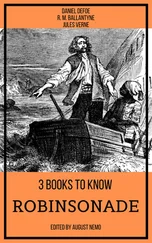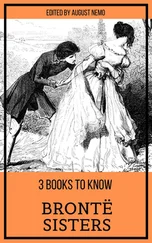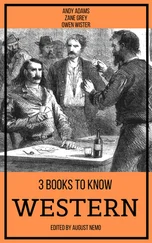We found several more droves of hogs in the woods, but abstained from killing any of them, having more than sufficient for our present necessities. We saw, also, many of their footprints in this neighbourhood. Among these we also observed the footprints of a smaller animal, which we examined with much care, but could form no certain opinion as to them. Peterkin thought they were those of a little dog, but Jack and I thought differently. We became very curious on this matter, the more so that we observed these footprints to lie scattered about in one locality, as if the animal which had made them was wandering round about in a very irregular manner and without any object in view. Early in the forenoon of our third day we observed these footprints to be much more numerous than ever, and in one particular spot they diverged off into the woods in a regular beaten track, which was, however, so closely beset with bushes that we pushed through it with difficulty. We had now become so anxious to find out what animal this was, and where it went to, that we determined to follow the track and, if possible, clear up the mystery. Peterkin said, in a bantering tone, that he was sure it would be cleared up, as usual, in some frightfully simple way, and prove to be no mystery at all!
The beaten track seemed much too large to have been formed by the animal itself, and we concluded that some larger animal had made it, and that the smaller one made use of it. But everywhere the creeping plants and tangled bushes crossed our path, so that we forced our way along with some difficulty. Suddenly, as we came upon an open space, we heard a faint cry, and observed a black animal standing in the track before us.
“A wild cat!” cried Jack, fitting an arrow to his bow, and discharging it so hastily that he missed the animal, and hit the earth about half-a-foot to one side of it. To our surprise, the wild cat did not fly, but walked slowly towards the arrow and snuffed at it.
“That’s the most comical wild cat I ever saw!” cried Jack.
“It’s a tame wild cat, I think,” said Peterkin, levelling his spear to make a charge.
“Stop!” cried I, laying my hand on his shoulder. “I do believe the poor beast is blind. See, it strikes against the branches as it walks along. It must be a very old one;” and I hastened towards it.
“Only think,” said Peterkin with a suppressed laugh, “of a superannuated wild cat!”
We now found that the poor cat was not only blind, or nearly so, but extremely deaf, as it did not hear our footsteps until we were quite close behind it. Then it sprang round, and, putting up its back and tail, while the black hair stood all on end, uttered a hoarse mew and a fuff.
Poor thing said Peterkin, gently extending his hand and endeavouring to pat the cat’s head. “Poor pussy! chee, chee, chee! puss, puss, puss! cheetie pussy!”
No sooner did the cat hear these sounds than all signs of anger fled, and advancing eagerly to Peterkin, it allowed itself to be stroked, and rubbed itself against his legs, purring loudly all the time, and showing every symptom of the most extreme delight.
“It’s no more a wild cat than I am!” cried Peterkin, taking it in his arms; “it’s quite tame. — Poor pussy! cheetie pussy!”
We now crowded around Peterkin, and were not a little surprised — and, to say truth, a good deal affected — by the sight of the poor animal’s excessive joy. It rubbed its head against Peterkin’s cheek, licked his chin, and thrust its head almost violently into his neck, while it purred more loudly than I ever heard a cat purr before, and appeared to be so much overpowered by its feelings that it occasionally mewed and purred almost in the same breath. Such demonstrations of joy and affection led us at once to conclude that this poor cat must have known man before, and we conjectured that it had been left either accidentally or by design on the island many years ago, and was now evincing its extreme joy at meeting once more with human beings. While we were fondling the cat and talking about it, Jack glanced round the open space in the midst of which we stood.
“Hallo!” exclaimed he; “this looks something like a clearing. The axe has been at work here. Just look at these tree-stumps.”
We now turned to examine these, and without doubt we found trees that had been cut down here and there, also stumps and broken branches — all of which, however, were completely covered over with moss, and bore evidence of having been in this condition for some years. No human footprints were to be seen either on the track or among the bushes, but those of the cat were found everywhere. We now determined to follow up the track as far as it went, and Peterkin put the cat down; but it seemed to be so weak, and mewed so very pitifully, that he took it up again and carried it in his arms, where in a few minutes it fell sound asleep.
About ten yards farther on, the felled trees became more numerous, and the track, diverging to the right, followed for a short space the banks of a stream. Suddenly we came to a spot where once must have been a rude bridge, the stones of which were scattered in the stream, and those on each bank entirely covered over with moss. In silent surprise and expectancy we continued to advance, and a few yards farther on, beheld, under the shelter of some bread-fruit trees, a small hut or cottage. I cannot hope to convey to my readers a very correct idea of the feelings that affected us on witnessing this unexpected sight. We stood for a long time in silent wonder, for there was a deep and most melancholy stillness about the place that quite overpowered us; and when we did at length speak, it was in subdued whispers, as if we were surrounded by some awful or supernatural influence. Even Peterkin’s voice, usually so quick and lively on all occasions, was hushed now; for there was a dreariness about this silent, lonely, uninhabited cottage — so strange in its appearance, so far away from the usual dwellings of man, so old, decayed, and deserted in its aspect that fell upon our spirits like a thick cloud, and blotted out as with a pall the cheerful sunshine that had filled us since the commencement of our tour round the island.
The hut or cottage was rude and simple in its construction. It was not more than twelve feet long by ten feet broad, and about seven or eight feet high. It had one window, or rather a small frame in which a window might perhaps once have been, but which was now empty. The door was exceedingly low, and formed of rough boards, and the roof was covered with broad cocoa-nut and plantain leaves. But every part of it was in a state of the utmost decay. Moss and green matter grew in spots all over it. The woodwork was quite perforated with holes; the roof had nearly fallen in, and appeared to be prevented from doing so altogether by the thick matting of creeping plants and the interlaced branches which years of neglect had allowed to cover it almost entirely; while the thick, luxuriant branches of the bread-fruit and other trees spread above it, and flung a deep, sombre shadow over the spot, as if to guard it from the heat and the light of day. We conversed long and in whispers about this strange habitation ere we ventured to approach it; and when at length we did so, it was, at least on my part, with feelings of awe.
At first Jack endeavoured to peep in at the window; but from the deep shadow of the trees already mentioned, and the gloom within, he could not clearly discern objects, so we lifted the latch and pushed open the door. We observed that the latch was made of iron, and almost eaten away with rust. In the like condition were also the hinges, which creaked as the door swung back. On entering, we stood still and gazed around us, while we were much impressed with the dreary stillness of the room. But what we saw there surprised and shocked us not a little. There was no furniture in the apartment save a little wooden stool and an iron pot, the latter almost eaten through with rust. In the corner farthest from the door was a low bedstead, on which lay two skeletons, embedded in a little heap of dry dust. With beating hearts we went forward to examine them. One was the skeleton of a man; the other that of a dog, which was extended close beside that of the man, with its head resting on his bosom.
Читать дальше












